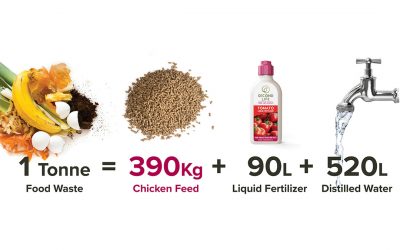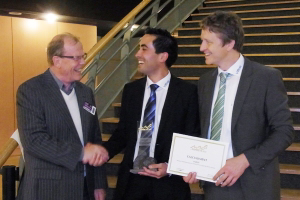Why Israel is leading global agricultural technology

Limited resources and little foreign trade have fostered innovation in Israeli agriculture. Today, Israel’s agtech sector is 2nd only to the US.
Anyone with a keen interest in modern agriculture will have noticed that Israeli agtech innovations are popping up left, right, and centre. Israel spends 4.3% of its GDP on research and development – the most of any country – and according to the World Economic Forum, it is where companies embrace change the most and where innovative companies grow the fastest.
73 years after gaining statehood, Israel is making David Ben-Gurion’s dream of ‘making the desert bloom’ a reality. 17% of Israel’s total agricultural budget is allocated to R&D, and close cooperation between farmers, the agricultural industry, technological research, and the government seems to be a recipe for success.
Kibbutzim sowing seeds of innovation
Well before statehood had even been achieved, early Israeli pioneers sowed the seeds of agricultural innovation by founding the first kibbutz: an agricultural community focused on sharing land and resources and working together to tackle tough farming challenges. Harsh land, scarce water, a limited labour force, and limited trade with neighbouring countries stimulated resourcefulness in Israeli agriculture, and the kibbutzim ‘can-do’-attitude still characterises this sector.
Even today, the kibbutzim lie at the basis of Israeli agtech innovation, and more than half of the country’s agtech ventures are managed by someone who grew up in a kibbutz.
The Silicon Wadi
Just as the kibbutzim foster agricultural innovation, so too does the Israeli tech industry. Often referred to as the ‘Silicon Wadi’ (‘Wadi’ meaning ‘valley’ in Arabic), Israel has become a major tech hub, with companies such as Microsoft, Google, and Amazon tapping into Israeli knowhow and running substantial operations in the country.
However, high-tech multinationals are not the only driving force behind technological innovation in Israel: higher education, too, influences the country’s tech climate – and so do the Israel Defence Forces (IDF).
Though well-known for inventing the Iron Dome – an air defence system capable of intercepting incoming missiles – the IDF’s strongest forte is perhaps education. Every Israeli spends between 2-3 years in the IDF, and during this time, many develop skills in computer science and engineering. Additionally, the IDF helps recruits to develop operational and leadership skills, meaning those who leave the IDF do so armed with technical knowledge as well as the interpersonal skills required to lead a start-up.
We try to connect all the relevant players in the agricultural community…
Community support for a fruitful agtech climate
A third factor contributing to the positive agtech business climate in Israel is the strong community support, led by GrowingIL. A government initiative of the Israel innovation Institute, Ministry of Economy, Ministry of Agriculture and Rural Development, and Israel Innovation Authority, GrowingIL aims to develop the Israeli agtech ecosystem and reshape Israeli agriculture to meet emerging global food needs through the implementation of ground-breaking technologies. Doron Meller, GrowingIL Executive Director, tells us how the initiative stimulates growth in the Israeli agtech sector.
Doron Meller, GrowingIL Executive Director, tells us how the initiative stimulates growth in the Israeli agtech sector. “We try to connect all the relevant players in the agricultural community: entrepreneurs, start-ups, academia, investors, government, agribusiness, food companies, service providers, et cetera – anyone relevant for this ecosystem. We try to understand their needs and build our operations according to that.” Meller says.
The development of this ecosystem rests on 4 pillars, Meller explains:
- ”…we organise various different kinds of events, such as workshops, webinars, meetups, competitions, hackathons and conferences,” he says.
- ”…we develop tools, ranging from unique internet sites to pair start-ups with pilots, to marketplaces, mentor programmes, and agtech investor maps.
- ”…we have a strong focus on bringing the online community together via our social media and newsletters, providing information on knowledge opportunities, job opportunities, and investment,” he explains,
- Meller comments, GrowingIL is “…like a live CRM, connecting all the relevant players in Israel and abroad.”
The sheer amount of up-and-coming Israeli agtech innovation begs the question: is there something in the water? Meller laughs: “That’s the thing: we don’t have enough water. We have an entrepreneurial spirit, and we have a great tech atmosphere, starting with the tech units in the IDF. We see a lot of people entering agtech from different backgrounds, such as blockchain and artificial intelligence.
“Plus, Israel is a small country. Back in the day, there were very limited resources: there was no water and no equipment, so traditional agriculture needed to do more with less. This translates into a ‘do more with less’ attitude, focused on accurate water and farm management,” Meller says, and this rings true: drip irrigation is an Israeli invention, one which Netafim uses to grow more with less. Meller adds, “We benefit from agricultural research by the Volcani Institute, the Hebrew University Faculty of Agriculture, and the Weizman Institute of Science, who have worldwide recognition.”
3 Israeli feed start-ups to watch
All About Feed has previously reported on Israeli company Hargol, which produces grasshoppers for human consumption and petfood, but the Silicon Wadi has much more to offer the animal feed industry. These are 3 feed start-ups to watch.
- Vaxa TechnologiesVaxa Technologies has developed a patented technology for sustainable indoor microalgae cultivation to produce omega-3 fatty acids. Their patented process improves omega-3 yield while reducing production costs.
- FreezeM
FreezeM has developed methods for condensing and freezing fly eggs in large quantities for easy defrosting on organic waste. Once defrosted, the eggs grow into larvae that eat the waste, thereby rapidly increasing their mass. The fully grown larvae can then be harvested and processed into protein meal.
- Genufeed
Genufeed has developed a natural, sustainable alternative to extruded fish feed. Their technology is based on a natural capsule of high-quality protein and fat, which it enriches with essential nutritional elements necessary for fish health and growth. Their emphasis is on keeping all macro- and micro-nutrients as close to their original, natural form as possible.










